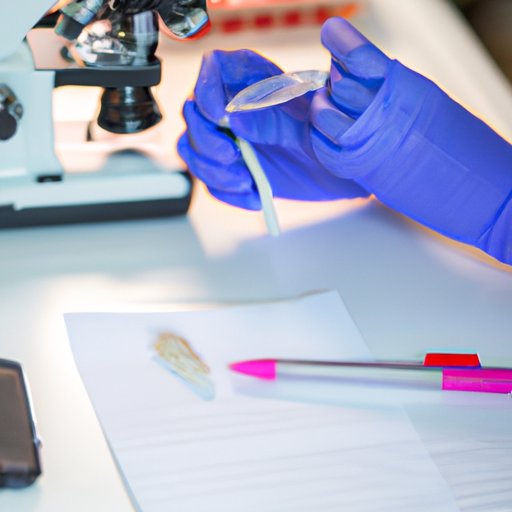Introduction
Toxicology is a branch of forensic science that deals with the study of toxins, their effects on living organisms, and their application in criminal investigations. It is a vital tool for law enforcement officials, as it can help identify the presence of drugs or poisons in a person’s body, establish the cause of death, and determine the time of death. This article will explore the role of toxicology in forensic science, how it is used to solve crimes, its importance in criminal investigations, and the benefits of utilizing toxicology in forensic science.

Examining the Role of Toxicology in Forensic Science
Toxicology plays a crucial role in forensic science by helping investigators understand the circumstances surrounding a crime and identifying any substances that may have been present at the scene. Toxicologists use a variety of methods to analyze evidence and determine a cause of death, such as collecting and analyzing samples from crime scenes, examining the effects of toxins on the body, and establishing the source of a toxin.

Understanding How Toxicology is Used to Solve Crimes
Toxicology is used in forensic science to investigate evidence and determine a cause of death. A toxicologist can examine a deceased individual’s bodily fluids, tissues, and organs to identify drugs or poisons present in the body. In addition, they can collect and analyze samples from a crime scene to determine the types of substances present and examine the effects of toxins on the body.

Exploring the Importance of Toxicology in Criminal Investigations
The use of toxicology in criminal investigations is essential for providing accurate information about a case. Toxicology can be used to establish the time of death, understand the circumstances surrounding a crime, and examine a suspect’s behavior and mental state. Toxicology can also provide valuable insight into the cause of death, helping to ensure that justice is served.
Investigating the Benefits of Toxicology in Forensic Science
Toxicology has many advantages when it comes to forensic science. Using toxicology in investigations can improve the accuracy of results, enhance public safety, and increase the efficiency of law enforcement. According to a study published in the Journal of Forensic Sciences, “toxicology testing has become an invaluable investigative tool in cases involving homicide, suicide, drug overdoses, and suspicious deaths.”
Analyzing the Use of Toxicology in Crime Scene Analysis
Toxicology is also used in crime scene analysis to determine the types of substances present, examine the effects of toxins on the body, and establish the source of a toxin. Toxicologists can use a variety of techniques, such as gas chromatography and mass spectrometry, to analyze evidence and identify potential suspects. By doing so, they can provide more accurate information about a case and help law enforcement officials bring criminals to justice.
Conclusion
Toxicology plays an integral role in forensic science. It is used to investigate evidence and determine a cause of death, identify drugs or poisons present in the body, establish the time of death, understand the circumstances surrounding a crime, and examine a suspect’s behavior and mental state. Toxicology is also beneficial for improving the accuracy of investigations, enhancing public safety, and increasing the efficiency of law enforcement. Toxicology is an invaluable tool for forensic science and can help bring criminals to justice.
(Note: Is this article not meeting your expectations? Do you have knowledge or insights to share? Unlock new opportunities and expand your reach by joining our authors team. Click Registration to join us and share your expertise with our readers.)
